-
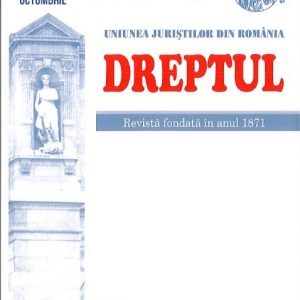 The new normative framework established in matters of public procurement, of sectoral procurement and of concessions, was required in considering the necessity to transpose the three European directives of 2014 into our domestic law. In addition to the three normative acts, it has been adopted a special normative act that regulates the remedies and the means of appeal in the matter of the procedure of award of the public procurement contracts, of the sectoral contracts and of the works concession and services concession contracts. In the ambience of the new normative framework thus established, this study intends to make a detailed analysis concerning the settlement by administrativejurisdictional means of the disputes derived from the procedure of award of these contracts, as well as the means of appeal that may be exercised against the decision of the body vested with administrative-jurisdictional powers.
The new normative framework established in matters of public procurement, of sectoral procurement and of concessions, was required in considering the necessity to transpose the three European directives of 2014 into our domestic law. In addition to the three normative acts, it has been adopted a special normative act that regulates the remedies and the means of appeal in the matter of the procedure of award of the public procurement contracts, of the sectoral contracts and of the works concession and services concession contracts. In the ambience of the new normative framework thus established, this study intends to make a detailed analysis concerning the settlement by administrativejurisdictional means of the disputes derived from the procedure of award of these contracts, as well as the means of appeal that may be exercised against the decision of the body vested with administrative-jurisdictional powers. -
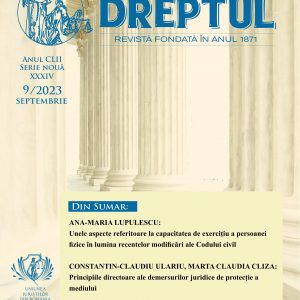
-
 In this study, the author proves that the adoption of 5 resolutions of the Government of Romania, during 2005-2010, regulating the operation of deconcentrated public services, organized at regional level (each including many counties) is unconstitutional in relation to the provisions of art. 120 and 123 of the Constitution of Romania (revised and republished), since, according to these constitutional rules, the deconcentration of public administration can be done only at the level of counties or the Bucharest municipality, and the prefect (appointed in each country and in the Bucharest municipality) is the representative of the Government at local level, having – among other things – the competence to manage the deconcentrated public services of the ministries and of the other specialized central administration bodies in the administrativeterritorial units.
In this study, the author proves that the adoption of 5 resolutions of the Government of Romania, during 2005-2010, regulating the operation of deconcentrated public services, organized at regional level (each including many counties) is unconstitutional in relation to the provisions of art. 120 and 123 of the Constitution of Romania (revised and republished), since, according to these constitutional rules, the deconcentration of public administration can be done only at the level of counties or the Bucharest municipality, and the prefect (appointed in each country and in the Bucharest municipality) is the representative of the Government at local level, having – among other things – the competence to manage the deconcentrated public services of the ministries and of the other specialized central administration bodies in the administrativeterritorial units. -
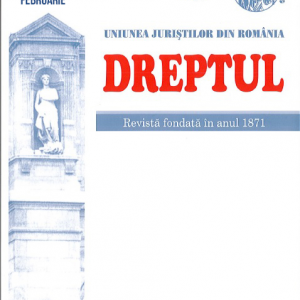 The present analysis was carried out in order to clarify the situation in which the heads of claim do not have a clear and justified correspondent with the arguments presented in the statement of claim, as well as possible procedural solutions which can resolve such an issue. From the sources analyzed so far, it appears that there is no straight forward solution for this situation neither in the legal provisions, case law or speciality lectures. The premise of our study consists in the situation in which a claimant submits a request containing only one head of claim, although the content of the statement of claim includes also arguments and grounds which are not related to the one and only head of claim which was mentioned in the application, because they refer to different legal topics which are not properly expressed at the beginning of the statement of claim, as head of claim. The present analysis concerns the issues arising from the above mentioned situation both for the claimant and defendant, but also which are the remedies at their hand if such situations will occur. In addition to this, the study presents also the remedies available from the courts’ perspective if such a situation appears in different phases of the trial, but also the consequences of this situation if the issue is not addressed properly by the parties or by the court before the issuance of the court ruling.
The present analysis was carried out in order to clarify the situation in which the heads of claim do not have a clear and justified correspondent with the arguments presented in the statement of claim, as well as possible procedural solutions which can resolve such an issue. From the sources analyzed so far, it appears that there is no straight forward solution for this situation neither in the legal provisions, case law or speciality lectures. The premise of our study consists in the situation in which a claimant submits a request containing only one head of claim, although the content of the statement of claim includes also arguments and grounds which are not related to the one and only head of claim which was mentioned in the application, because they refer to different legal topics which are not properly expressed at the beginning of the statement of claim, as head of claim. The present analysis concerns the issues arising from the above mentioned situation both for the claimant and defendant, but also which are the remedies at their hand if such situations will occur. In addition to this, the study presents also the remedies available from the courts’ perspective if such a situation appears in different phases of the trial, but also the consequences of this situation if the issue is not addressed properly by the parties or by the court before the issuance of the court ruling. -
 The study examines the issue of unlawful interceptions and audio or video recordings made during preliminary acts, i.e. prior to prosecution; this is a common problem the case law courts are often faced with. The conclusion that interceptions and carrying out audio or video recordings prior to the start of a criminal trial are unlawful is produced by the author based on the analysis of the Constitutional Court’s jurisprudence on this matter and of power of res judicata accompanying the Constitutional Court’s judgments which is attached not only to the operative part, but also to the considerations underpinning it.
The study examines the issue of unlawful interceptions and audio or video recordings made during preliminary acts, i.e. prior to prosecution; this is a common problem the case law courts are often faced with. The conclusion that interceptions and carrying out audio or video recordings prior to the start of a criminal trial are unlawful is produced by the author based on the analysis of the Constitutional Court’s jurisprudence on this matter and of power of res judicata accompanying the Constitutional Court’s judgments which is attached not only to the operative part, but also to the considerations underpinning it. -
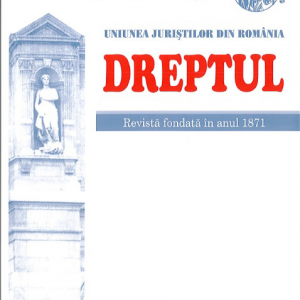 The study refers to the way in which national criminal processual legislation provides safeguards regarding the respect for the right to a fair trial, with particular reference to the obligation of the courts of law to properly motivate the solutions they pronounce in solving the merits or even the ordinary remedy of appeal. From the research made, the author concludes that the European standards do not find an explicit consecration in the current national legislation and identifies situations from the recent case law in which the courts have directly applied the European conventional provisions, by abolishing the sentences analyzed and sending the case for retrial by the same court even without Article 421 (2) b) of the Criminal Procedure Code providing such a case. The author proposes that it should be completed de lege ferenda the text itself previously invoked by including a case which should refer to the failure to provide proper motivation for the sentence of the court examining the merits and he continues the argumentation by proposing the extension in the same way also of the cases in which an review in cassation may be lodged against the decisions of the courts of appeal. The conclusion he reaches has in view the fact that the two legislative amendments would be likely to provide adequate safeguards to the right to a fair trial in criminal matters, without the need to resort to conventional provisions which should be conferred direct applicability, a solution often avoided by the courts in this field.
The study refers to the way in which national criminal processual legislation provides safeguards regarding the respect for the right to a fair trial, with particular reference to the obligation of the courts of law to properly motivate the solutions they pronounce in solving the merits or even the ordinary remedy of appeal. From the research made, the author concludes that the European standards do not find an explicit consecration in the current national legislation and identifies situations from the recent case law in which the courts have directly applied the European conventional provisions, by abolishing the sentences analyzed and sending the case for retrial by the same court even without Article 421 (2) b) of the Criminal Procedure Code providing such a case. The author proposes that it should be completed de lege ferenda the text itself previously invoked by including a case which should refer to the failure to provide proper motivation for the sentence of the court examining the merits and he continues the argumentation by proposing the extension in the same way also of the cases in which an review in cassation may be lodged against the decisions of the courts of appeal. The conclusion he reaches has in view the fact that the two legislative amendments would be likely to provide adequate safeguards to the right to a fair trial in criminal matters, without the need to resort to conventional provisions which should be conferred direct applicability, a solution often avoided by the courts in this field. -
 Potrivit art. 46 alin. (1) C.pr.pen., pentru motive temeinice privind mai buna desfășurare a judecății, instanța poate dispune disjungerea acesteia cu privire la unii dintre inculpați sau la unele dintre infracțiuni. Conform art. 421 pct. 2 lit. b) C.pr.pen., instanța, judecând apelul, pronunță una dintre următoarele soluții: admite apelul și desființează sentința primei instanțe și dispune rejudecarea de către instanța a cărei hotărâre a fost desființată pentru motivul că judecarea cauzei la acea instanță a avut loc în lipsa unei părți nelegal citate sau care, legal citată, a fost în imposibilitate de a se prezenta și de a înștiința instanța despre această imposibilitate, invocată de acea parte. Rejudecarea de către instanța a cărei hotărâre a fost desființată se dispune și atunci când instanța nu s-a pronunțat asupra unei fapte reținute în sarcina inculpatului prin actul de sesizare sau asupra acțiunii civile ori când există vreunul dintre cazurile de nulitate absolută, cu excepția cazului de necompetență, când se dispune rejudecarea de către instanța competentă. Articolul 6 paragr. 1 din Convenția (europeană) pentru apărarea drepturilor omului și a libertăților fundamentale (în continuare „Convenția”) stabilește că orice persoană are dreptul la judecarea cauzei sale în mod echitabil, în mod public și într-un termen rezonabil, de către o instanță independentă și imparțială, instituită de lege, care va hotărî fie asupra încălcării drepturilor și obligațiilor sale cu caracter civil, fie asupra temeiniciei oricărei acuzații în materie penală îndreptate împotriva sa. Potrivit art. 2 paragr. 1 din Protocolul nr. 7 la Convenție, orice persoană declarată vinovată de o infracțiune de către un tribunal are dreptul să ceară examinarea declarației de vinovăție sau a condamnării de către o jurisdicție superioară. Exercitarea acestui drept, inclusiv motivele pentru care acesta poate fi exercitat, sunt reglementate de lege. (cu notă aprobativă).
Potrivit art. 46 alin. (1) C.pr.pen., pentru motive temeinice privind mai buna desfășurare a judecății, instanța poate dispune disjungerea acesteia cu privire la unii dintre inculpați sau la unele dintre infracțiuni. Conform art. 421 pct. 2 lit. b) C.pr.pen., instanța, judecând apelul, pronunță una dintre următoarele soluții: admite apelul și desființează sentința primei instanțe și dispune rejudecarea de către instanța a cărei hotărâre a fost desființată pentru motivul că judecarea cauzei la acea instanță a avut loc în lipsa unei părți nelegal citate sau care, legal citată, a fost în imposibilitate de a se prezenta și de a înștiința instanța despre această imposibilitate, invocată de acea parte. Rejudecarea de către instanța a cărei hotărâre a fost desființată se dispune și atunci când instanța nu s-a pronunțat asupra unei fapte reținute în sarcina inculpatului prin actul de sesizare sau asupra acțiunii civile ori când există vreunul dintre cazurile de nulitate absolută, cu excepția cazului de necompetență, când se dispune rejudecarea de către instanța competentă. Articolul 6 paragr. 1 din Convenția (europeană) pentru apărarea drepturilor omului și a libertăților fundamentale (în continuare „Convenția”) stabilește că orice persoană are dreptul la judecarea cauzei sale în mod echitabil, în mod public și într-un termen rezonabil, de către o instanță independentă și imparțială, instituită de lege, care va hotărî fie asupra încălcării drepturilor și obligațiilor sale cu caracter civil, fie asupra temeiniciei oricărei acuzații în materie penală îndreptate împotriva sa. Potrivit art. 2 paragr. 1 din Protocolul nr. 7 la Convenție, orice persoană declarată vinovată de o infracțiune de către un tribunal are dreptul să ceară examinarea declarației de vinovăție sau a condamnării de către o jurisdicție superioară. Exercitarea acestui drept, inclusiv motivele pentru care acesta poate fi exercitat, sunt reglementate de lege. (cu notă aprobativă). -
 Potrivit art. 248 C.pen. din 1968, fapta funcționarului public ce, în exercițiul atribuțiilor sale de serviciu, cu știință, nu îndeplinește un act ori îl îndeplinește în mod defectuos și prin aceasta cauzează o tulburare însemnată bunului mers al unui organ sau al unei instituții de stat ori al unei alte unități din cele la care se referă art. 145 sau o pagubă patrimoniului acesteia se pedepsește cu închisoare de la 6 luni la 5 ani.
Potrivit art. 248 C.pen. din 1968, fapta funcționarului public ce, în exercițiul atribuțiilor sale de serviciu, cu știință, nu îndeplinește un act ori îl îndeplinește în mod defectuos și prin aceasta cauzează o tulburare însemnată bunului mers al unui organ sau al unei instituții de stat ori al unei alte unități din cele la care se referă art. 145 sau o pagubă patrimoniului acesteia se pedepsește cu închisoare de la 6 luni la 5 ani. -
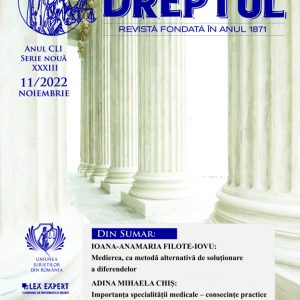 Through this material we tried to identify the reasons that were the basis for the adoption of Article 1622 of the Civil Code, through which certain third parties are protected from the effects of compensations potentially prejudicial to their situation. After exposing some preliminary considerations regarding the institution of compensation, we set out to present the main hypotheses that would be subsumed under this legal provision. Along with their evocation, we tried to extract the interests predominantly protected by the legislator, which justifies the blocking of the compensation. We believe that understanding these cases is essential for the fair application of Article 1622.
Through this material we tried to identify the reasons that were the basis for the adoption of Article 1622 of the Civil Code, through which certain third parties are protected from the effects of compensations potentially prejudicial to their situation. After exposing some preliminary considerations regarding the institution of compensation, we set out to present the main hypotheses that would be subsumed under this legal provision. Along with their evocation, we tried to extract the interests predominantly protected by the legislator, which justifies the blocking of the compensation. We believe that understanding these cases is essential for the fair application of Article 1622. -
 This article deals with an offence substantially amended under the new Criminal Code – i.e. the failure to comply with judgments. After a brief comparative presentation of new and old regulations, the author describes and analyzes the normative versions of the new wording: opposition to the execution, by making a stand against the enforcement authority; refusal of the enforcement authority to implement a judgment, by which it is bound to perform a certain act; refusal to assist the enforcement authority in the implementation of the judgment by people who are liable in this matter under the law; non-enforcement of judgment ordering the reinstatement of an employee; default in enforcing the judgment on the payment of wages within 15 days from the date of its enforcement application submitted to the employer by the interested Party; non-compliance of judgments on the establishment, payment, updating and recalculation of pensions; prevention of a person to use, in whole or in part, a property owned under a Court ruling, by the one against whom the same is enforceable.
This article deals with an offence substantially amended under the new Criminal Code – i.e. the failure to comply with judgments. After a brief comparative presentation of new and old regulations, the author describes and analyzes the normative versions of the new wording: opposition to the execution, by making a stand against the enforcement authority; refusal of the enforcement authority to implement a judgment, by which it is bound to perform a certain act; refusal to assist the enforcement authority in the implementation of the judgment by people who are liable in this matter under the law; non-enforcement of judgment ordering the reinstatement of an employee; default in enforcing the judgment on the payment of wages within 15 days from the date of its enforcement application submitted to the employer by the interested Party; non-compliance of judgments on the establishment, payment, updating and recalculation of pensions; prevention of a person to use, in whole or in part, a property owned under a Court ruling, by the one against whom the same is enforceable. -
 Potrivit art. 349 alin. (1) C.pen., neluarea vreuneia dintre măsurile legale de securitate și sănătate în muncă de către persoana care avea îndatorirea de a lua aceste măsuri, dacă se creează un pericol iminent de producere a unui accident de muncă sau de îmbolnăvire profesională, se pedepsește cu închisoare de la 6 luni la 3 ani sau cu amendă.
Potrivit art. 349 alin. (1) C.pen., neluarea vreuneia dintre măsurile legale de securitate și sănătate în muncă de către persoana care avea îndatorirea de a lua aceste măsuri, dacă se creează un pericol iminent de producere a unui accident de muncă sau de îmbolnăvire profesională, se pedepsește cu închisoare de la 6 luni la 3 ani sau cu amendă. -
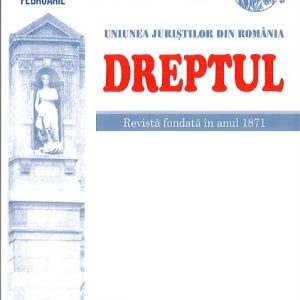 This study aims to present the main amendments that were brought to the Labour Code in France by the Law No 1088/2016. The emphasizing of these amendments seems to be a relevant one, given the many similarities between the French and Romanian labour legislation and also the fact that even France, which had a traditional labour legislation, has amended it for the purpose of rendering more flexible labour relations. In order to emphasize the amendments brought, the study contains a few comparative references also with regard to the regulation existing until the adoption of this normative act. As a fundamental guideline, the rights of employers are increased, but there are also regulations favourable to the employees. A change of vision is noticed with regard to the roles of the sources of labour law, for the purpose of bringing to the foreground the collective bargaining at the level of unit, to the detriment of the legal norms and of the conventional norms at level of branch of activity.
This study aims to present the main amendments that were brought to the Labour Code in France by the Law No 1088/2016. The emphasizing of these amendments seems to be a relevant one, given the many similarities between the French and Romanian labour legislation and also the fact that even France, which had a traditional labour legislation, has amended it for the purpose of rendering more flexible labour relations. In order to emphasize the amendments brought, the study contains a few comparative references also with regard to the regulation existing until the adoption of this normative act. As a fundamental guideline, the rights of employers are increased, but there are also regulations favourable to the employees. A change of vision is noticed with regard to the roles of the sources of labour law, for the purpose of bringing to the foreground the collective bargaining at the level of unit, to the detriment of the legal norms and of the conventional norms at level of branch of activity. -
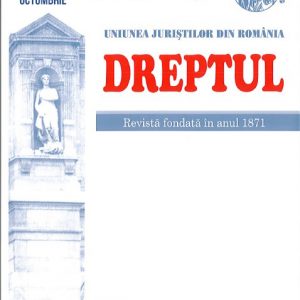 Both in the Member States and at European and international level there are currently concerns for finding the best means of combating tax fraud and tax evasion. Recent measures place the good tax governance among the means of fighting against this phenomenon, and it is estimated that joint actions at European level are more effective, being meant to encourage also third countries to apply minimum standards of good tax governance. At the same time, the concept of good tax governance, as well as those of tax fraud and tax evasion are taken under consideration by the doctrinaires in the field of criminal and tax law, but the definitions given to them have been imprecise and sometimes contradictory. In this context, we intend to emphasize the contribution of good tax governance as an effective means to prevent and mitigate tax fraud and tax evasion both at national, European and international level.
Both in the Member States and at European and international level there are currently concerns for finding the best means of combating tax fraud and tax evasion. Recent measures place the good tax governance among the means of fighting against this phenomenon, and it is estimated that joint actions at European level are more effective, being meant to encourage also third countries to apply minimum standards of good tax governance. At the same time, the concept of good tax governance, as well as those of tax fraud and tax evasion are taken under consideration by the doctrinaires in the field of criminal and tax law, but the definitions given to them have been imprecise and sometimes contradictory. In this context, we intend to emphasize the contribution of good tax governance as an effective means to prevent and mitigate tax fraud and tax evasion both at national, European and international level. -
 Resulting from the frontal collision of two criminal law systems at the level of the legislation, theory and practice of criminal law, the crisis of the (science of) criminal law in Romania is a crisis of the „technical-legal method”. This crisis resulted from the lack of thoroughly analysing the foundations of this method configured in terms of general juridical theory in the context of the Historical School of Law from Germany, received in the particular matter of the theory of criminal law thanks to the contribution of the Italian criminal specialists (Arturo Rocco) and which became a traditional method of the Romanian science of criminal law due to its reception in Italy by Vintilă Dongoroz. In the broader plan of the general theory of law, the same crisis proves to be a crisis of the idea of science of law, explicable by the vicissitudes of the reception of the Historical School of Law in Romania over the last 150 years.
Resulting from the frontal collision of two criminal law systems at the level of the legislation, theory and practice of criminal law, the crisis of the (science of) criminal law in Romania is a crisis of the „technical-legal method”. This crisis resulted from the lack of thoroughly analysing the foundations of this method configured in terms of general juridical theory in the context of the Historical School of Law from Germany, received in the particular matter of the theory of criminal law thanks to the contribution of the Italian criminal specialists (Arturo Rocco) and which became a traditional method of the Romanian science of criminal law due to its reception in Italy by Vintilă Dongoroz. In the broader plan of the general theory of law, the same crisis proves to be a crisis of the idea of science of law, explicable by the vicissitudes of the reception of the Historical School of Law in Romania over the last 150 years. -

-

-
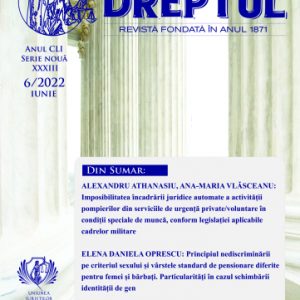
-
 The Law No 136/1995 on insurance and reinsurance in Romania did not expressly mention that the insurer acquires a right of regress against the person responsible for causing the prejudice, but only that the former is subrogated in all rights of the insured or of the beneficiary of the insurance. The wording has generated some different interpretations in practice as regards the action of the insurer to the reparation of the prejudice, this being classified either as special action, founded on the civil tort liability, or as action of common law, based on the civil contractual liability. These interpretations have led to the express regulation of the action for regress within Article 31 (6) of the Government Emergency Ordinance No 54/2016 concerning the compulsory motor vehicle insurance for civil liability for the prejudices caused to third parties by vehicle and tram accidents, which has repealed the Law No 136/1995, but which does not have a law for adoption yet.
The Law No 136/1995 on insurance and reinsurance in Romania did not expressly mention that the insurer acquires a right of regress against the person responsible for causing the prejudice, but only that the former is subrogated in all rights of the insured or of the beneficiary of the insurance. The wording has generated some different interpretations in practice as regards the action of the insurer to the reparation of the prejudice, this being classified either as special action, founded on the civil tort liability, or as action of common law, based on the civil contractual liability. These interpretations have led to the express regulation of the action for regress within Article 31 (6) of the Government Emergency Ordinance No 54/2016 concerning the compulsory motor vehicle insurance for civil liability for the prejudices caused to third parties by vehicle and tram accidents, which has repealed the Law No 136/1995, but which does not have a law for adoption yet. -
 The Law No 136/1995 on insurance and reinsurance in Romania did not expressly mention that the insurer acquires a right of regress against the person responsible for causing the prejudice, but only that the former is subrogated in all rights of the insured or of the beneficiary of the insurance. The wording has generated some different interpretations in practice as regards the action of the insurer to the reparation of the prejudice, this being classified either as special action, founded on the civil tort liability, or as action of common law, based on the civil contractual liability. These interpretations have led to the express regulation of the action for regress within Article 31 (6) of the Government Emergency Ordinance No 54/2016 concerning the compulsory motor vehicle insurance for civil liability for the prejudices caused to third parties by vehicle and tram accidents, which has repealed the Law No 136/1995, but which does not have a law for adoption yet.
The Law No 136/1995 on insurance and reinsurance in Romania did not expressly mention that the insurer acquires a right of regress against the person responsible for causing the prejudice, but only that the former is subrogated in all rights of the insured or of the beneficiary of the insurance. The wording has generated some different interpretations in practice as regards the action of the insurer to the reparation of the prejudice, this being classified either as special action, founded on the civil tort liability, or as action of common law, based on the civil contractual liability. These interpretations have led to the express regulation of the action for regress within Article 31 (6) of the Government Emergency Ordinance No 54/2016 concerning the compulsory motor vehicle insurance for civil liability for the prejudices caused to third parties by vehicle and tram accidents, which has repealed the Law No 136/1995, but which does not have a law for adoption yet. -
 The present scientific approach has as object the notarial activity and its development between the medieval moment of the imperial or papal authorisations and the era of artificial intelligence. Thus, the author approaches the role of the medieval notary in Transylvania, emphasizing the procedural or substantial aspects of notarial documents, presents the graphic elements of their notarial seals, but also succeeds in analyzing from the same perspectives the activities of the contemporary notary, the impact of new technologies and of the digitalization on this activity.
The present scientific approach has as object the notarial activity and its development between the medieval moment of the imperial or papal authorisations and the era of artificial intelligence. Thus, the author approaches the role of the medieval notary in Transylvania, emphasizing the procedural or substantial aspects of notarial documents, presents the graphic elements of their notarial seals, but also succeeds in analyzing from the same perspectives the activities of the contemporary notary, the impact of new technologies and of the digitalization on this activity. -

-
 The Government Decision No 196/2016 has approved the preliminary thesis of the draft Administrative Code. The Government’s intention to give an incentive to the adoption of the Administrative Code, although it is salutary, is not the first. In recent years, several other proposals circulated in Romania for the adoption of an Administrative Code, which however have not been successful, so that, more than 25 years after the change of the political regime in our country, the practitioners, as well as the theorists of the administrative law are confronted with an unsystematized legislation, lacking coherence here and there and generating very different jurisprudential solutions, as well as administrative practice solutions. Within this study, the author intends to discuss some specific issues raised by these theses of the draft Administrative Code, namely: the unity and the ideological and, implicitly, terminological coherence in the administrative law; the organisation of the central public administration, including of its relations with its decentralized structures; the status of the civil servants, as well as the status applicable to the contractual staff of the public administration and the organization, functioning and disputed claims of the public services.
The Government Decision No 196/2016 has approved the preliminary thesis of the draft Administrative Code. The Government’s intention to give an incentive to the adoption of the Administrative Code, although it is salutary, is not the first. In recent years, several other proposals circulated in Romania for the adoption of an Administrative Code, which however have not been successful, so that, more than 25 years after the change of the political regime in our country, the practitioners, as well as the theorists of the administrative law are confronted with an unsystematized legislation, lacking coherence here and there and generating very different jurisprudential solutions, as well as administrative practice solutions. Within this study, the author intends to discuss some specific issues raised by these theses of the draft Administrative Code, namely: the unity and the ideological and, implicitly, terminological coherence in the administrative law; the organisation of the central public administration, including of its relations with its decentralized structures; the status of the civil servants, as well as the status applicable to the contractual staff of the public administration and the organization, functioning and disputed claims of the public services. -
 In this study, the author makes an analysis of the notion of “consumer” according to art. 6 of the Regulation (EC) no. 593/2008 of the European Parliament and of the Council of 17 June 2008 on the law applicable to contractual obligations (called „Rome I) as compared to the regulation of this notion in the Romanian law (mainly in the Consumer Code – Law no. 296/2004 as subsequently amended and supplemented), emphasizing that the established Romanian law in this matter, although slightly different from the European law (Rome I) does not contradict the European law, but only explains it better and, partially, extends its incidence, and this to the benefit of consumers.
In this study, the author makes an analysis of the notion of “consumer” according to art. 6 of the Regulation (EC) no. 593/2008 of the European Parliament and of the Council of 17 June 2008 on the law applicable to contractual obligations (called „Rome I) as compared to the regulation of this notion in the Romanian law (mainly in the Consumer Code – Law no. 296/2004 as subsequently amended and supplemented), emphasizing that the established Romanian law in this matter, although slightly different from the European law (Rome I) does not contradict the European law, but only explains it better and, partially, extends its incidence, and this to the benefit of consumers. -
 The study aims to analyze the situation in the domestic law of the application of the institution of transfer of undertaking in relation to the exigences of Directive 2001/23/EC as interpreted by the Court of Justice of the European Union. The premise of a correct interpretation and application of this institution is the knowledge of the essential aspects developed in t he case law of the Court of Justice of the European Union that analyzes the scope of application ratione materiae of Directive 2001/23/EC, among which are emphasized the distinction made by the Court between labour force-based companies and companies whose activity necessarily involves the exploitation of goods, as well as the autonomous meaning attributed to the notion of „conventional assignment”. Furthermore, the author shows that the regulation of the notion of transfer of undertaking from the domestic law restricts the scope of application ratione materiae of the Directive 2001/23/EC, non-compliant conditions being imposed, such as the transfer of the property right from the assignor to the assignee and the existence of a contractual link between the assignor and the assignee. The analysis of the judicial practice of the national courts and of the opinions expressed in the doctrine shows that a unitary point of view has not been outlined with regard to the possibility of applying the principle of conforming interpretation of the domestic law in order to ensure the full effect of the provisions of Directive 2001/23/EC. In a first opinion, it is argued that the full effect application of the Directive from the perspective of the scope of application ratione materiae can be achieved through a conforming interpretation of the domestic law which allows to leave the contrary internal legal provisions be disregarded, without thereby reaching to a direct application of Directive 2001/23/EC. According to the second point of view, the extension of the institution of the transfer of undertaking over the express normative content of the internal provisions, in the absence of any legal operation of assignment or merger, without having as object the property right, would be an interpretation contra legem. In compliance with the limits of the principle of conforming interpretation stated in the case law of the Court of Justice of the European Union, the conclusion supported by the author of this study is that the conforming interpretation of the national law is an effective remedy for the full application of the provisions of Directive 2001/23/EC.
The study aims to analyze the situation in the domestic law of the application of the institution of transfer of undertaking in relation to the exigences of Directive 2001/23/EC as interpreted by the Court of Justice of the European Union. The premise of a correct interpretation and application of this institution is the knowledge of the essential aspects developed in t he case law of the Court of Justice of the European Union that analyzes the scope of application ratione materiae of Directive 2001/23/EC, among which are emphasized the distinction made by the Court between labour force-based companies and companies whose activity necessarily involves the exploitation of goods, as well as the autonomous meaning attributed to the notion of „conventional assignment”. Furthermore, the author shows that the regulation of the notion of transfer of undertaking from the domestic law restricts the scope of application ratione materiae of the Directive 2001/23/EC, non-compliant conditions being imposed, such as the transfer of the property right from the assignor to the assignee and the existence of a contractual link between the assignor and the assignee. The analysis of the judicial practice of the national courts and of the opinions expressed in the doctrine shows that a unitary point of view has not been outlined with regard to the possibility of applying the principle of conforming interpretation of the domestic law in order to ensure the full effect of the provisions of Directive 2001/23/EC. In a first opinion, it is argued that the full effect application of the Directive from the perspective of the scope of application ratione materiae can be achieved through a conforming interpretation of the domestic law which allows to leave the contrary internal legal provisions be disregarded, without thereby reaching to a direct application of Directive 2001/23/EC. According to the second point of view, the extension of the institution of the transfer of undertaking over the express normative content of the internal provisions, in the absence of any legal operation of assignment or merger, without having as object the property right, would be an interpretation contra legem. In compliance with the limits of the principle of conforming interpretation stated in the case law of the Court of Justice of the European Union, the conclusion supported by the author of this study is that the conforming interpretation of the national law is an effective remedy for the full application of the provisions of Directive 2001/23/EC.
